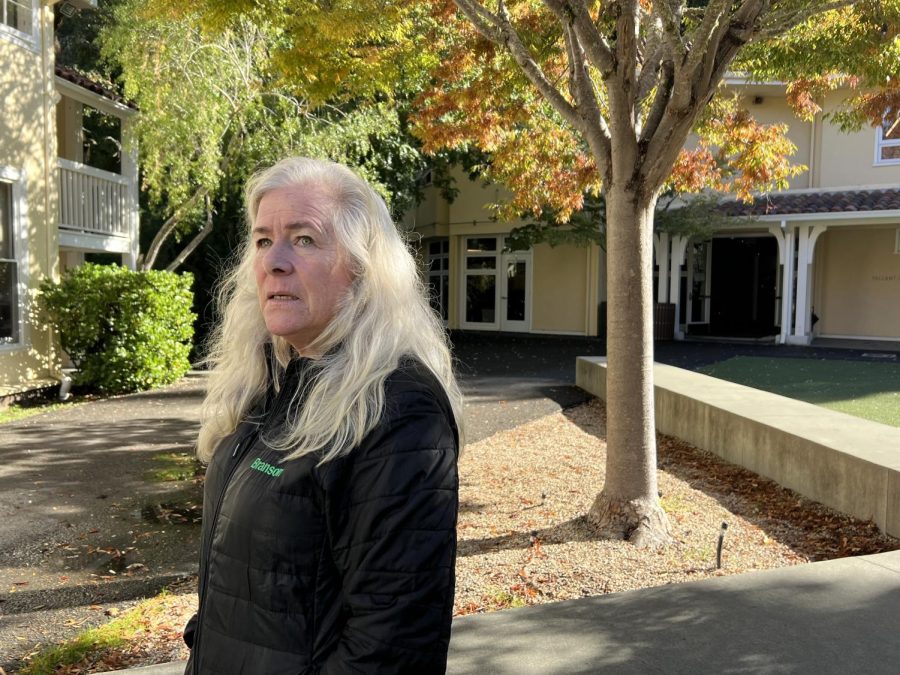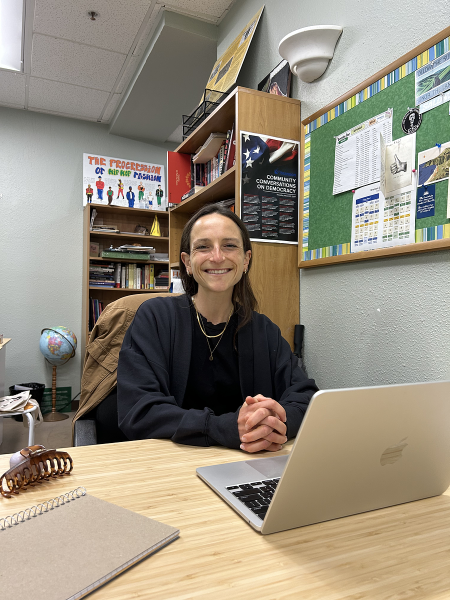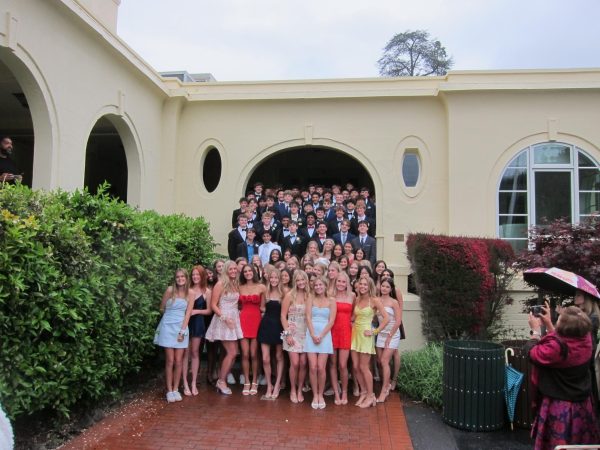Preview of ‘Legally Blonde’: A conversation with Maura Vaughn
Maura Vaughn, Branson’s theater director. The fall musical premieres Nov. 10.
November 1, 2022
How is the musical coming along?
There’s always a number of different aspects to any creative endeavor. The students have their trajectory through investigating the play, developing their characters and knowing their choreography and songs. All of that’s on schedule, almost perfectly, which is really interesting because it’s never usually this on schedule. And yet, I have one actor that is going to have shoulder surgery, another who has a concussion and a few others who aren’t feeling well. All of it shows how the collective has stepped up for each other in order for the musical to be right on time.
On top of that, the ensemble this year has been amazing. Every single one of the freshmen all the way up to the seniors has come together as a group and they are really a team. When one person’s missing, others step up and someone is always there to cover the position and help the rehearsal run smoothly. It’s been really nice to see.
In terms of all the orchestration, it’s an extremely complicated aspect. The professionals get to come in for one rehearsal where they make all the transactions with the actors, and then we’re running, and everyone just has to keep up.
How did you choose “Legally Blonde” as this year’s performance?
I sent out an email to the entire school and said, “What do we want to do?” I got a lot of responses, but my favorite was [from] a teacher who asked that we do the “Book of Mormon,” which I just can’t do in a school. But it’s really fun to see who asks to do what. And then I take the top four, and I look to see if the rights are available. For “Legally Blonde,” the rights were not actually available. They gave us the London rights and not the American rights. Because of that, you will notice every now and then, the music or the dance cuts are a little different. Next, I check the demographic in terms of what we need and the challenges for each of the actors, singers and dancers. And then I ask, “What’s the message?” Now I should probably ask that first, but if we don’t have the rights, it doesn’t matter, and if it requires operatic voices and we don’t have those, it doesn’t matter. So that’s really the last factor we look at.
Another aspect of the decision process is I try to do musicals where there is a large assembly. I do my best to not cut people who audition because it’s high school and the whole point of high school is to try things, which you can’t do if you don’t get in. So the large assembly allows people to know whether they want to continue to get serious about this or if it was just sort of a fun social thing.
What has been your favorite part of directing the musical this year?
It’s how well this particular group has come together and, most importantly, the collective dedication to the piece, regardless of each cast member’s amount of stage time. And I can’t forget the freshmen who are just amazing and have been unbelievably professional. They have a clear understanding of what’s expected of them and where their responsibilities lie, and they take it quite seriously. Plus, they are all having fun and talking too much, like everyone else.
Have there been any other difficulties in this experience?
There are always scheduling difficulties. This year we have several students in tennis and one in volleyball, which brings up minor amounts of conflict. But, usually, people don’t get concussions or need shoulder surgery. In any endeavor that requires a collective, there’s always going to be stuff that happens. Which is the other great thing about this cast: everyone is taking it in stride.
How does this year’s musical compare to past years?
Musicals are always an act of juggling as fast as you can because there are four components. There’s the narrative component, the musical component, the choreographic component, which is the dance, and then there is the technical component. I’m almost afraid to say any of this, because it’s all been going relatively smoothly. I feel like I’m surfing this very long wave, and I’m holding my breath, hoping I don’t fall.
Have there been any major modifications to the script?
The whole show started out as a book, which is very different. The main changes were that there was no Emmett in the book, and you never find out who’s helping Elle along her journey. In the movie, on the other hand, there are three different endings. One is that Vivian and Elle end up in the Caribbean, which the writers didn’t like because it portrayed them as having a romantic relationship. The second is when Emmett asks Elle to marry him. They turned this ending down because it centers on the idea that she needs to be married or be a love interest. So, finally, they decided on her giving the graduation speech and Elle being the one to ask Emmet for marriage. […] All of this resulted because of the traditional understanding of tragedy and comedy, specifically Aristotle’s. A long time ago, he declared that comedy has to end in a marriage, and society has sort of carried that along. And so, on some end, the musical ends in a promise of marriage.
Any final thoughts you would like to add?
The last thing, which is also one of the advantages of this show, is that although the movie really centered around Elle’s journey and you could sort of see how other people were affected by Elle, it wasn’t quite as obvious or straightforward. In the musical, everyone is affected by this transformation in a positive way. Every character finds more of who they are as they are challenged to look up and say, “Wait, what do I actually think versus what have I been told to think?” Or, “Before I decide to look at this person from a stereotypical point of view, who is this person really, who am I really, and who do I want to be?” So everyone in the musical really has a transformation, except for the dog.
All the actors have this enormous arc that they have to find, investigate and then apply to all of the choices they are making as an actor so that the audience can see. I think that’s why there is such a high level of commitment among the cast. If it’s only one transformative arc, it’s a fun show, but when you get this series of arcs, you realize that there is actually a message to this show. For this musical, that message is to be who you are, stand proud and lead with a sense of kindness. And if you bring people along, you are going to find the reward at the end, which is really that you get to be true to yourself and become proud of what you’ve done.
When will “Legally Blonde” be premiering?
Nov. 10, 11 and 12 at 7 p.m. I know that different groups of people have already gotten a block of like 40 tickets, so the moment that the tickets come out, people who want to see the show need to be on it and purchase a ticket/reserve a seat since it’s free.






